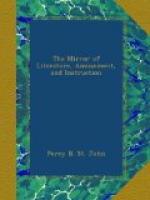Of the Selections, generally, we shall only observe, that our aim has been to convey information and improvement in the most amusing form. When we sit down to the pleasant task of cutting open—not cutting up—a book, we say, “If this won’t turn out something, another will; no matter—’tis an essay upon human nature. (We) get (our) labour for (our) pains—’tis enough—the pleasure of the experiment has kept (our) senses, and the best part of (our) blood awake, and laid the gross to sleep.” In this way we find many good things, and banish the rest; we attempt to “boke something new,” and revive others. Thus we have described the Siamese Twins in a single number; and in others we have brought to light many almost forgotten antiquarian rarities.
Of Engravings, Paper, and Print, we need say but little: each speaks prima facie, for itself. Improvement has been studied in all of them; and in the Cuts, both interest and execution have been cardinal points. Milan Cathedral; Old Tunbridge Wells and its Old Visitors; Clifton; Gurney’s Steam Carriage; and the Bologna Towers; are perhaps the best specimens: and by way of varying architectural embellishments, a few of the Wonders of Nature have been occasionally introduced.
Owen Feltham would call this “a cart-rope” Preface: therefore, with promises of future exertion, we hope our next Seven Years may be as successful as the past.
143, Strand, Dec. 24, 1829.
[Illustration: Thomas Campbell, Esq.]
* * * * *
MEMOIR OF THOMAS CAMPBELL, ESQ.
Of the subject of this memoir, it has been remarked, “that he has not, that we know of, written one line, which, dying, he could wish to blot.” These few words will better illustrate the fitness of Mr. Campbell’s portrait for our volume, than a laudatory memoir of many pages. He has not inaptly been styled the Tyrtaeus of modern English poetry, and one of the most chaste and tender as well as original of poets. He owes less than any other British poet to his predecessors and contemporaries. He has lived to see his lines quoted like those of earlier poets in the literature of his day, lisped by children, and sung at public festivals. The war-odes of Campbell have scarcely anything to match them in-the English language for energy and fire, while their condensation and the felicitous selection of their versification are in remarkable harmony. Campbell, in allusion to Cymon, has been said to have “conquered both on land and sea,” from his Naval Odes and “Hohenlinden” embracing both scenes of warfare.




